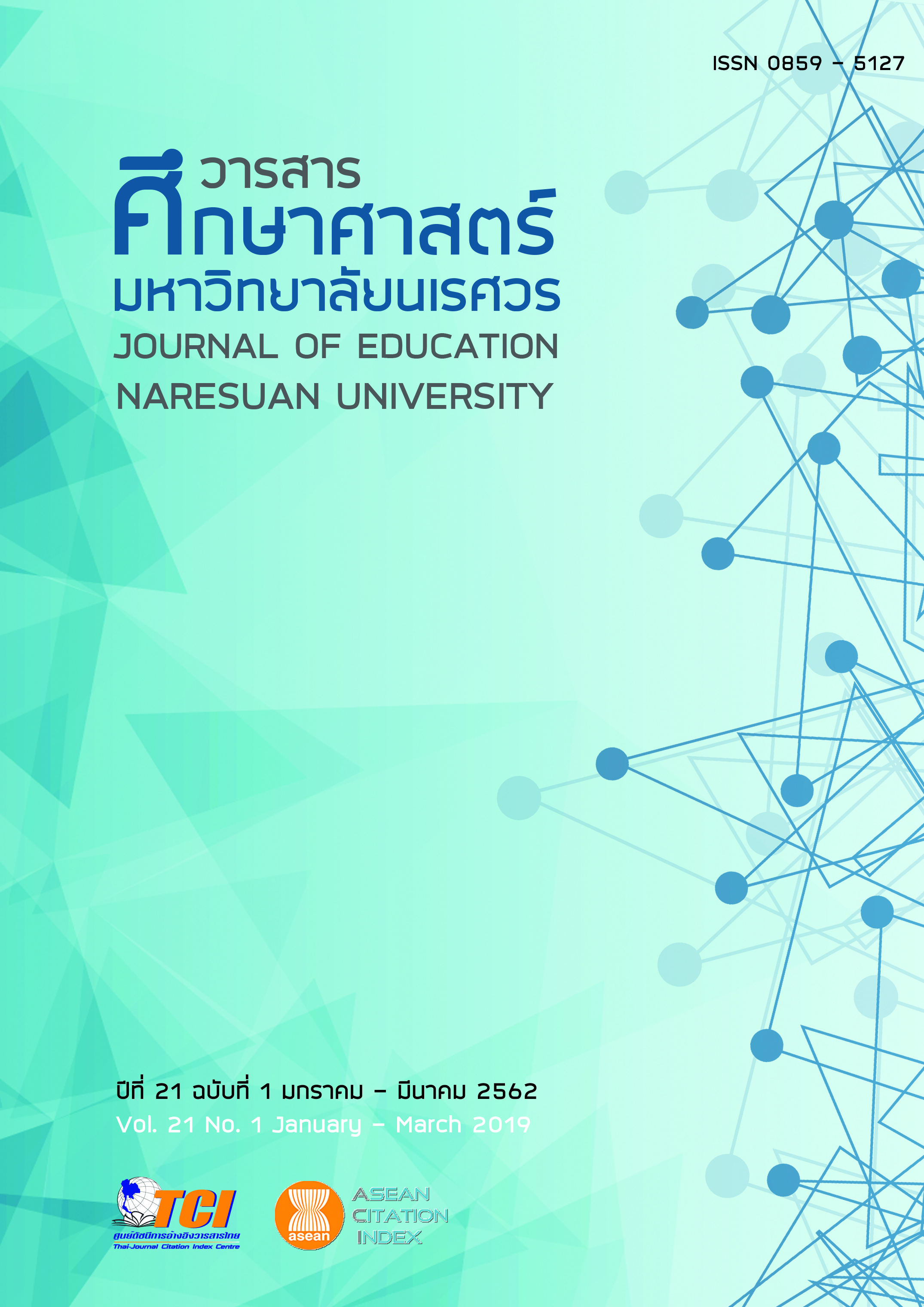การศึกษาแนวคิดของนักเรียน เรื่อง ทวิภาวะของคลื่นและอนุภาค ตามกรอบการมองแบบพหุมิติของการจัดการเรียนรู้เพื่อเปลี่ยนแปลงแนวคิด (EXPLORING STUDENTS' CONCEPTION IN WAVE-PARTICLE DUALITY THROUGH MULTIDIMENSIONAL FRAMEWORK OF CONCEPTUAL CHANGE APPROACH)
Main Article Content
Abstract
งานวิจัยนี้เป็นงานวิจัยเชิงคุณภาพ มีวัตถุประสงค์เพื่อศึกษาสภาพจริงก่อนการสอนเกี่ยวกับแนวคิดเรื่องทวิภาวะของคลื่นและอนุภาคของนักเรียนระดับชั้นมัธยมศึกษาปีที่ 6 ตามกรอบการมองแบบพหุมิติของการจัดการเรียนรู้เพื่อเปลี่ยนแปลงแนวคิด ผลการวิจัยแสดงให้เห็นว่าแนวคิดและธรรมชาติของแนวคิดของนักเรียนที่ไม่สอดคล้องกับแนวคิดวิทยาศาสตร์ 4 ข้อ คือ 1) นักเรียนมีแนวคิดที่คลาดเคลื่อนตั้งแต่แนวคิดฟิสิกส์พื้นฐาน 2) นักเรียนไม่สามารถเชื่อมโยงระหว่างสมบัติของคลื่นกับอนุภาคได้ 3) นักเรียนประสบปัญหากับการอธิบายสิ่งที่เกิดขึ้นในการทดลอง 4) นักเรียนยังคงมีแนวคิดเเบบเดิมที่แสดงว่าเเสงเป็นคลื่นและอิเล็กตรอนเป็นอนุภาคในบริบทการทดลองของฟิสิกส์ยุคใหม่ สำหรับมุมมองทางด้านจิตใจพบว่านักเรียนบางส่วนมีแรงจูงใจเกี่ยวกับความเชื่ออยู่ในระดับต่ำ โดยเฉพาะในด้านเป้าหมายการเรียนรู้ ด้านความสนใจ/การให้คุณค่า และด้านการรับความรู้ความสามารถของตนเอง ซึ่งสิ่งเหล่านี้เป็นอุปสรรคต่อการเปลี่ยนแปลงแนวคิดของนักเรียนไปสู่แนวคิดทางวิทยาศาสตร์
EXPLORING STUDENTS' CONCEPTION IN WAVE-PARTICLE DUALITY THROUGH MULTIDIMENSIONAL FRAMEWORK OF CONCEPTUAL CHANGE APPROACH
This research is qualitative research which is aimed at exploring grade 12 students’ conception in wave-particle duality through multidimensional framework of conceptual change approach. The findings show that students’ conceptions and nature of the conceptions are not consistent with the scientific concepts, particularly 1) students have misconception about the fundamental concepts of physics, 2) students can not link between the properties of wave and particles, 3) students have difficulties in explaining what happened in the experiments, and 4) students still have classical physics concepts in that light is a wave and electrons are particles in the context of modern physics experiments. In term of affective perspective, students’ motivation beliefs is at low level, especially in aspect of goal orientation, interest value and self-efficiency. The findings show that there are many obstacles in changing students' conception to scientific concepts.
Article Details
The owner of the article does not copy or violate any of its copyright. If any copyright infringement occurs or prosecution, in any case, the Editorial Board is not involved in all the rights to the owner of the article to be performed.
References
Chi, M. T. H. (2008). Three types of conceptual change: Belief revision, mental model transformation, and categorical shift. In: Vosniadou, S., Ed., International Handbook of Research on Conceptual Change, Routledge, New York, 61-82.
Lederman, N. G., & Abell, S. K. (2014). Handbook of research on science education. London: Routledge.
Pintrich, P. R., Marx, R. W., & Boyle, R. A. (1993). Beyond cold conceptual change: The role of motivational beliefs and classroom contextual factors in the process of conceptual change. Review of Educational Research, 63(2), 167-199.
Posner, G. J., Strike, K. A., Hewson, P. W., & Gertzog, W. A. (1982). Accommodation of a scientific conception: toward a theory of conceptual change. Science Education, 66(2), 211-227.
Treagust, D., & Duit, R. (2008). Conceptual change: A discussion of theoretical, methodological and practical challenges for science education. Cultural Studies of Science Education, 3, 297-328.
Treagust, D., & Duit, R. (2009). Multiple perspectives of conceptual change in science and the challenges ahead. Journal of Science and Mathematics Education in Southeast Asia, 32(2), 89-104.
Tyson, L. M., Venville, G. J., & Harrison, A. G. (1996). A multidimensional framework for interpreting conceptual change events in the classroom. Science Education, 81, 387-404.


